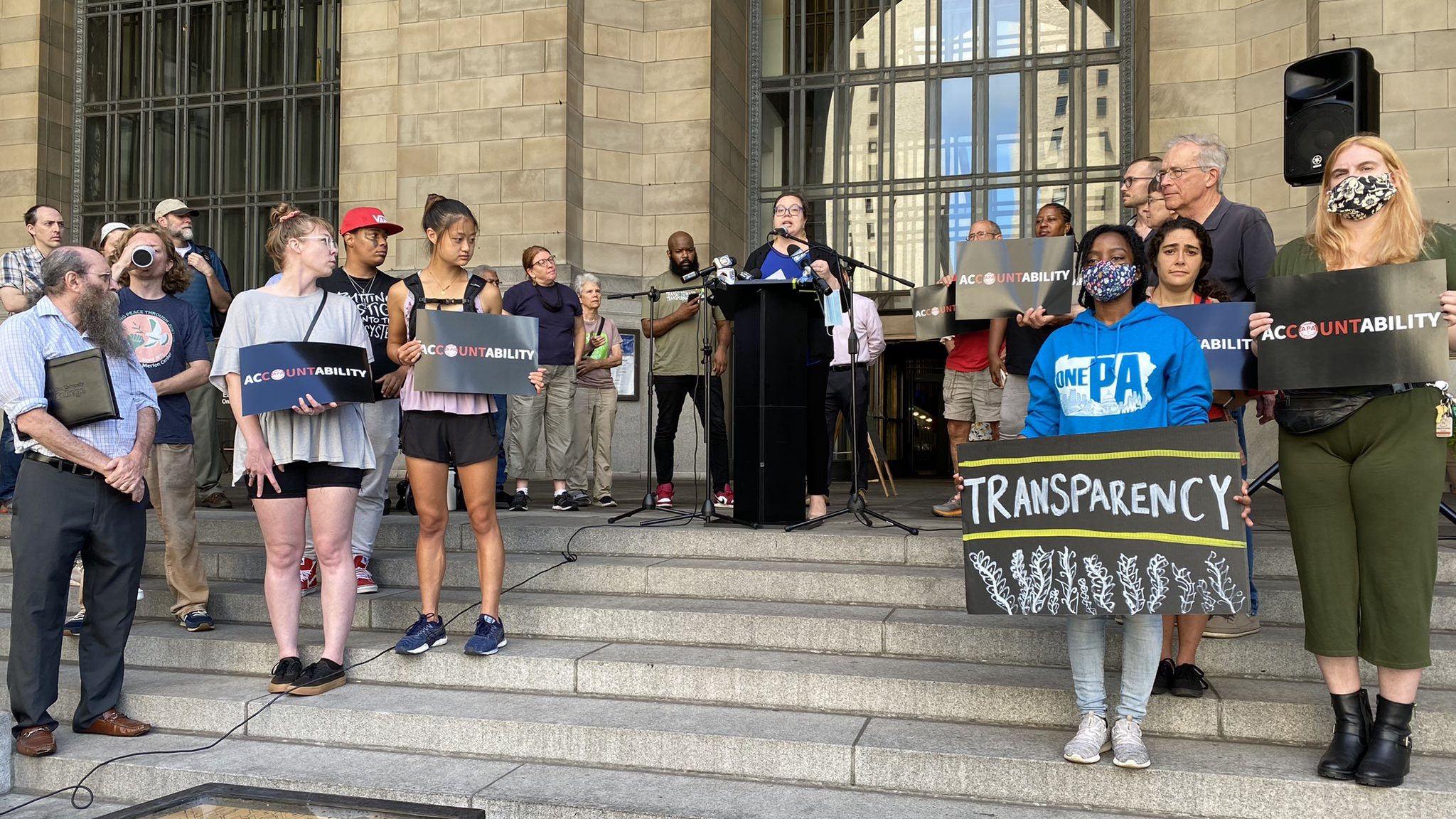
The City needs transparency and public input for COVID relief funding plan
Earlier this month, City Council voted 7-1 to approve Mayor Peduto’s allocation plan for the $336 million in COVID relief money. This allocation plan received zero public input before it was made public, just a few days prior to 2 public hearings on it. This was a historic amount of money that represented a once in a generation opportunity to invest in residents and our needs, but a top-down approach from Mayor Peduto and most of City Council will send hundreds of millions in public money to a spending plan that has little by way of detail or transparency.
Pittsburghers for Public Transit was proud to join hundreds of testifiers at these hearings. And organize a series of actions that were supported by dozens of organizations across the city. You can read about this campaign in these news articles:
- Pittsburgh City Council Urged To Delay Vote On COVID Aid Plan, by Chris Potter for WESA
- Pittsburgh community groups want City Council to hold off on taking vote tied to American Rescue Plan by Hannah Wyman for the Pittsburgh Post-Gazette
- Council hearing on American Rescue Plan funding reveals depth of need and ideas on spending $335M in federal funding by Tim Schooley for the Pittsburgh Business Times
or you can watch the press conference we help with Pittsburgh United here.
We will continue to push for more public participation and accountability in the City’s budget process, and we will continue to push for City investment in our public transit system, especially as we approach a change in Mayoral administrations.
Here is the testimony from PPT’s Director Laura Chu Wiens given at the July 13th public hearing on the ARPA spending plan:
My name is Laura Chu Wiens, and I am the Director of Pittsburghers for Public Transit. Our office is located at 5119 Penn Ave in Garfield. I am, like the other speakers today, appalled by the rushed budgeting of hundreds of millions of dollars of our taxpayer relief money and the absent public process that has resulted in this budget.
These funds do not need to be obligated until December 31, 2024 – more than 3 years from now. By front loading all this spending and putting it towards regular capital expenses, this administration is irreversibly harming our presumptive Mayor’s ability to support a recovery. Tens of millions towards building sustainability upgrades, updating street lights and electrifying the city’s vehicle fleet? This is not the intent of this emergency federal relief money—these are the types of uses that will be funded in the federal infrastructure package, which is being negotiated as we speak, or are purchases that should be made as part of the annual city budget. Even the Irvine/2nd Ave sidewalk replacement that we have been at the forefront of advocating for should not be funded from emergency relief money. Instead, it should come from the $14 million dollars that DOMI has already received to pay for the already obsolete Mon-Oakland Connector.
This past weekend, DOMI unveiled the MovePGH initiative, and talked about universal basic mobility for all Pittsburgh residents. Of this goal, we at PPT agree with DOMI–we believe that mobility is a right, and that the City has important role to play in ensuring that to be the case. But the Administration’s idea of universal mobility isn’t that universal—scooters and zipcars are inaccessible to those that need mobility most: those with young children, people with disabilities, youth, seniors. The private companies that Pittsburgh is relying on to provide this universal mobility are out for profit, and that has resulted in the mobility hubs being clustered in white and affluent neighborhoods. As part MovePGH, the Port Authority will have a trial period of giving out just up to a 100 people transit passes.
Contrast that with what transit riders have been calling for since the outset of the pandemic, for just $4-8 million dollars emergency relief money to allow low-income riders to show their EBT cards to board transit for free, for a year. 75% of Port Authority trips begin or end in the City, and so the City would be an appropriate source of these funds. That’s universal basic mobility, to have unlimited access to transportation for all low-income residents not just in the City, but in the county, for less than the cost of the proposed streetlight upgrades. Wouldn’t that be transformative? Wouldn’t that provide desperately needed relief to City residents, and stimulate jobs and food access and fewer missed healthcare appointments for those who have been hardest hit by the pandemic?
We firmly support all the other powerful proposals that need to be funded, like robust support for renters, funding for CLTs and a $10 million food justice fund—these are the types of proposals that should be solicited from a true public process and funded from the American Rescue Plan, that would be key to a real recovery that centers and actually uplifts those most harmed. I urge Council to delay the vote and truly hold a people-centered process, that lifts up the needs and voices of Black and Brown Pittsburgh residents above all.